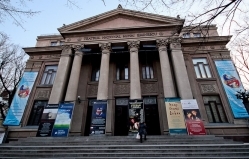
People call this holiday “St. Nicholas the Wonderworker”; St. Nicholas, known in the Orthodox calendar - Archbishop of Myra, the Hierarch St. Nicholas. The name itself Nicholas comes from Greek words nickel - victory and Laos of the people, which means "winner of the people." This name is one of the favorite common names of antiquity as well as our times.
Very long, interesting and instructive historical traditions are implied into stories about every day life and the modes of St. Nicholas. It is believed that he was born in 280, after the birth of Christ, to a very wealthy Christian family of Teofan and Nona in Patara (Lycia region, Central Asia). It is said that Nicholas began performing miracles from the first days of HIS life. When matured, he could even apparently raise the dead, he alos assisted in helping the poor, Nikolai's parents died when he was 18 years old and he received a large inheritance, which he distributed to the poor. Then he went to the city of Jerusalem, and there became an Orthodox priest.
It is said that when religious persecution began against the Orthodox Christians all were imprisoned and St. Nicholas was among them. When Constantine became the king of the Roman Empire, all prisoners was released and St. Nicholas went to the town of Myra (Lycia), to his mother land – again home. After the death of the Archbishop of Myra, Nicholas was appointed to the post of archbishop, where he served faithfully for 50 years.
It is very impressive the variety and number of good deeds of Nicholas. They called him the saint patron of merchants, fishermen, sailors, and he was considered the patron of orphans.
Some researchers believe that St. Nicholas = is the prototype of Santa Claus and Mosh Crăciun (in Moldovan language).
Nicholas died on 6 of December in 342. In 1087 his relics were moved from Myra to Bari in Italy. St. Nicholas Day is celebrated twice a year – on December 6 and 9 May. Nowadays, in Moldova we do celebrate both holidays. For all these good deeds he was eventually canonised.





